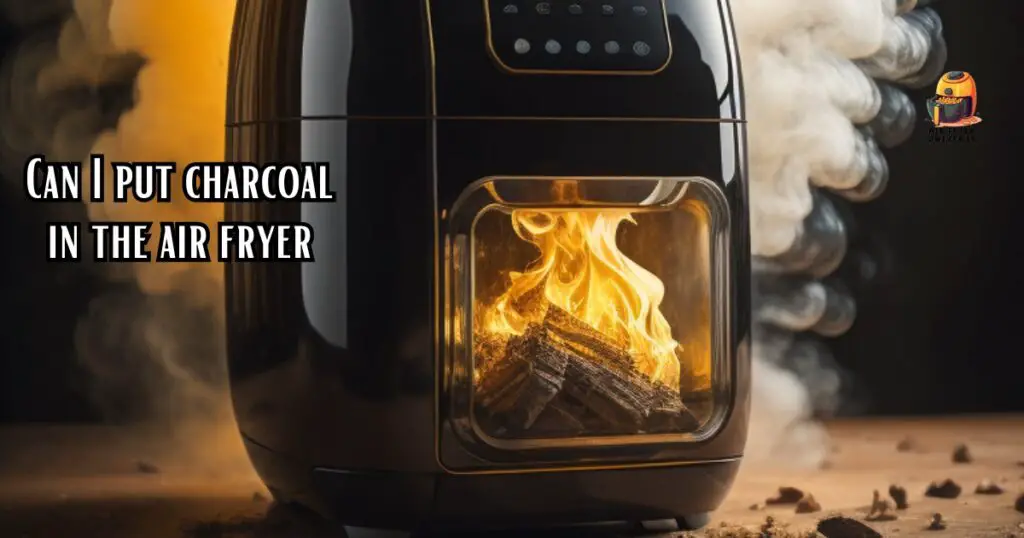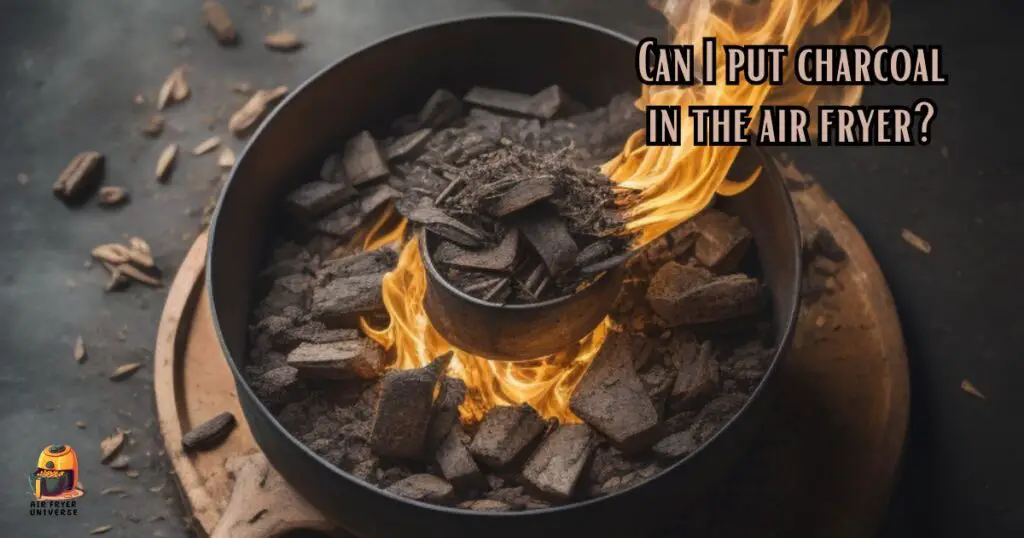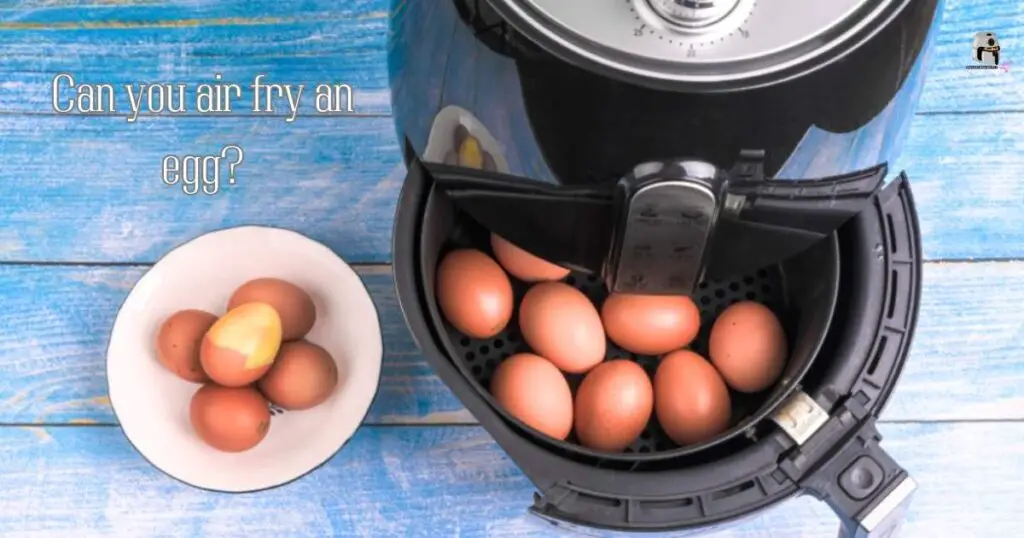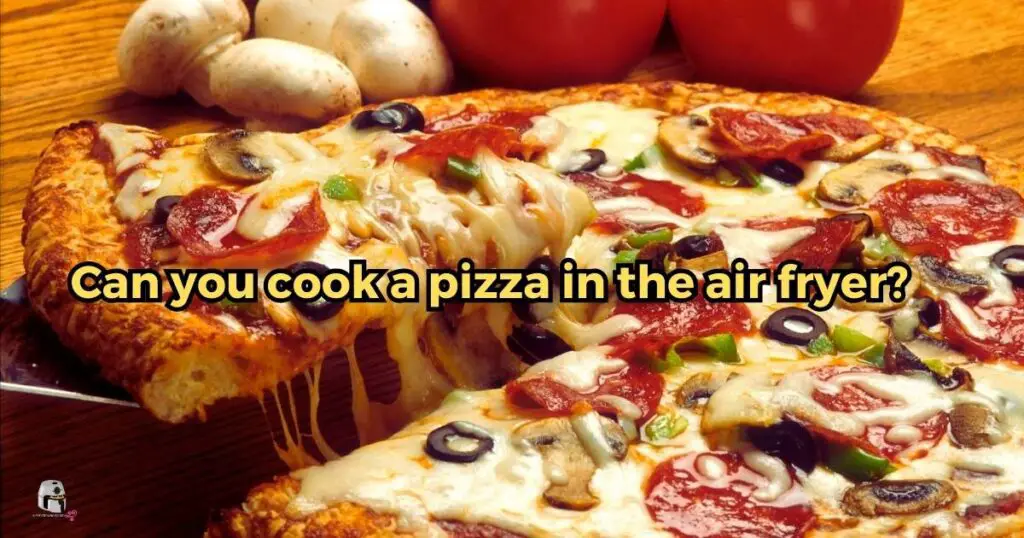Table Of Contents
No, you cannot put charcoal in the air fryer. It is highly discouraged due to several significant safety and health concerns. Burning charcoal inside an air fryer can lead to accidents, such as short circuits and fire hazards.
Because sparks and dust are released during combustion, additionally, exposing food to the toxic compounds released from burning charcoal, like tar, nitrosamines, and polycyclic aromatic hydrocarbons (PAHs), can be harmful and potentially carcinogenic.
Unlike traditional grilling, an air fryer does not allow for the rapid dissipation of these gases, increasing the risk of contact between these harmful substances and the food.

6 Alternatives of Using Charcoal in the Air Fryer

You can infuse a charcoal-like flavor into your air fryer-cooked foods without actually using charcoal. Here are 6 alternatives to using charcoal in an air fryer that can still infuse a smoky flavor into your foods:
1. Liquid Smoke
Liquid smoke is like a magic potion for making your food taste smoky as if it were cooked over a charcoal grill. It’s a liquid made by turning real wood smoke into a flavoring. You only need to add a few drops to your marinades or right onto your food to give it a delicious, smoky flavor. It’s an easy way to get that BBQ taste without using charcoal or real smoke.
2. Smoked Seasonings
Smoked seasonings are like regular spices, but they’ve been flavored with smoke to taste smoky. Think of smoked paprika or smoked salt. These seasonings give your food a delicious smoky flavor without needing charcoal or real smoke. They’re an easy way to make your dishes taste like they were cooked over a barbecue.
3. Wood Chips
Wood chips are small pieces of wood, often from hardwood trees like hickory, mesquite, or applewood. They are used in cooking to add a smoky flavor to food. When soaked in water and placed in a grill or smoker, the wood chips smolder and release aromatic smoke.
This smoke infuses the food with a delicious, natural smokiness, enhancing its flavor and making it a popular choice for barbecue and smoking enthusiasts.
3. Smoking Gun
A smoking gun is a kitchen device that infuses a smoky flavor into food and drinks. It works by generating controlled smoke using wood chips or herbs. By directing this smoke into a closed container with your food or drink, the smoking gun imparts a delightful smokiness.
It’s commonly used to add unique and aromatic flavors to various dishes or beverages, providing a restaurant-quality smoky touch at home.
4. Barbecue Sauce
Barbecue sauce is a flavorful condiment commonly used in grilling and barbecue cooking. It’s a thick, savory sauce made from ingredients like tomatoes, vinegar, sugar, and spices.
There are various types, such as sweet, spicy, or smoky, each with a unique taste profile. People use it to baste, marinate, or dip grilled meats and other dishes, enhancing their flavor with a tangy, sweet, or spicy kick.
5. Smoke Infused Oils
Smoke-infused oils are specialty cooking oils infused with smoky flavors like hickory or mesquite. These oils offer a convenient way to add a smoky essence to your dishes without the need for traditional smoking methods.
You can use them for marinating, drizzling, or sautéing to impart a subtle yet distinctive smokiness to your food, elevating its flavor profile in a simple and hassle-free manner.
Read More:
Charcoal Vs Gas Grills
Here’s a table summarizing the differences between charcoal and gas grills:
| Aspect | Charcoal Grills | Gas Grills |
| Flavor | The rich, smoky flavor | Less smoky flavor |
| Heat Control | Requires adjustment | Precise temperature |
| Preparation Time | Longer(15-20 minutes) | Faster (10 minutes) |
| Convenience | Less convenient | More convenient |
| Versatility | Limited | Multiple burners |
| Cleanup | Messier | Easier to clean |
| Cost (Initial) | Typically cheaper | Often more expensive |
| Fuel Cost (Ongoing) | Higher (charcoal) | Lower (propane/natural gas) |
Moreover, the choice between charcoal and gas grills depends on your preferences. Charcoal grills offer a rich, smoky flavor and a traditional grilling experience but require more time and effort. Gas grills, on the other hand, provide convenience, quick ignition, and precise temperature control, making them ideal for those seeking a hassle-free grilling experience. Your decision should align with your taste and lifestyle.
Pros and Cons of Using Charcoal
Here are the pros and cons of using charcoal:
Pros of Using Charcoal
- Flavor
One of the primary advantages of using charcoal for grilling is the distinctive flavor it imparts. Charcoal grilling infuses food with a rich, smoky taste, often associated with classic barbecue, enhancing the overall culinary experience and making it a preferred choice for those who savor this unique and delicious flavor.
- High Heat
Charcoal grills are known for their ability to reach high temperatures quickly and maintain intense heat levels. This feature is ideal for searing meats and achieving that coveted charred crust, adding depth and texture to grilled dishes. The high heat capability of charcoal grills is a significant advantage for many grill enthusiasts.
- Portability
Portability is a notable benefit of charcoal grills. Their compact and lightweight design makes them easy to transport and set up in various outdoor settings, from backyard gatherings to camping trips and picnics. This convenience allows grill enthusiasts to enjoy the smoky flavor of charcoal-grilled dishes wherever they choose to cook.
- Affordability
Charcoal grills are often more affordable than their gas counterparts, making them an accessible option for many consumers. The lower upfront cost allows individuals to enjoy the unique flavor and experience of charcoal grilling without a significant financial investment, making it a budget-friendly choice for outdoor cooking enthusiasts.
- Traditional Appeal
Charcoal grills hold a timeless and nostalgic appeal for many. They evoke the traditional and authentic spirit of outdoor cooking, harkening back to classic barbecue gatherings and family cookouts. This sense of tradition adds to the overall enjoyment of the grilling experience and is cherished by those who appreciate its heritage.
Cons of Using Charcoal
- Longer Prep Time
One drawback of using charcoal for grilling is the longer preparation time it requires. Charcoal grills typically take more time to light and reach the desired cooking temperature compared to gas grills. This extended preparation phase can delay the start of cooking and add extra time to the overall grilling process.
- Temperature Control
Temperature control in charcoal grilling can be challenging. Unlike gas grills with adjustable knobs for precise temperature settings, charcoal grills rely on manual adjustment of charcoal placement and airflow. This can result in uneven cooking and make it more difficult to maintain specific heat levels, especially for novice grillers.
- Cleanup
Charcoal grills often involve messier cleanup compared to gas grills. After grilling, the task of cleaning out ash and spent charcoal can be more labor-intensive. This process can create ash dust, requiring extra effort to maintain cleanliness and ensure proper disposal of charcoal remnants, adding to post-grilling maintenance.
- Safety
Safety is a concern with charcoal grills due to open flames and hot charcoal. Handling and lighting charcoal can pose burn risks. To prevent the development of carbon monoxide, proper ventilation is necessary. Additionally, the risk of fire is higher, especially if not handled with care, making safety precautions crucial during charcoal grilling.
- Environmental Impact
The environmental impact of charcoal grilling includes concerns related to charcoal production. Charcoal is often sourced from wood, which can contribute to deforestation when not harvested sustainably. The production process can also generate air pollution, making it less environmentally friendly compared to other grilling methods.
- Fuel Cost
Fuel cost is a consideration for charcoal grilling. Over time, the expense of charcoal can accumulate, especially for frequent grillers. Charcoal can be more costly than gas in the long run, making it important to factor in ongoing fuel expenses when choosing between charcoal and gas grills for your cooking needs.
FAQs
Can Using Aluminum and Charcoal Poison You?
No, using properly aluminum and charcoal cannot poison you. However, if not used properly, aluminum can react with acidic foods, causing a metallic taste. Additionally, inhaling excessive charcoal smoke or consuming foods with excessive ash contamination can lead to health issues. Proper grilling techniques and safety precautions are essential.
Is Coal Smoke Harmful in Food?
Yes, coal smoke in food can be harmful. Grilling with charcoal, especially at high temperatures and with fatty meats, can create carcinogens, increasing the risk of cancer. It’s essential to take precautions to reduce this risk, such as avoiding high-temperature grilling and choosing leaner cuts of meat.
Final Verdict
Putting charcoal in your air fryer is a bad idea. It’s not safe and can harm your health. Burning charcoal inside the fryer can cause sparks, dust, and even fires. It can also release harmful stuff that’s not good for you.
Instead, use things like liquid smoke or special seasonings to make your food taste smoky. Be safe and enjoy your air fryer without charcoal. Moreover, if you want to learn more, check out the full article for useful tips.
You May Also Like to Read:







